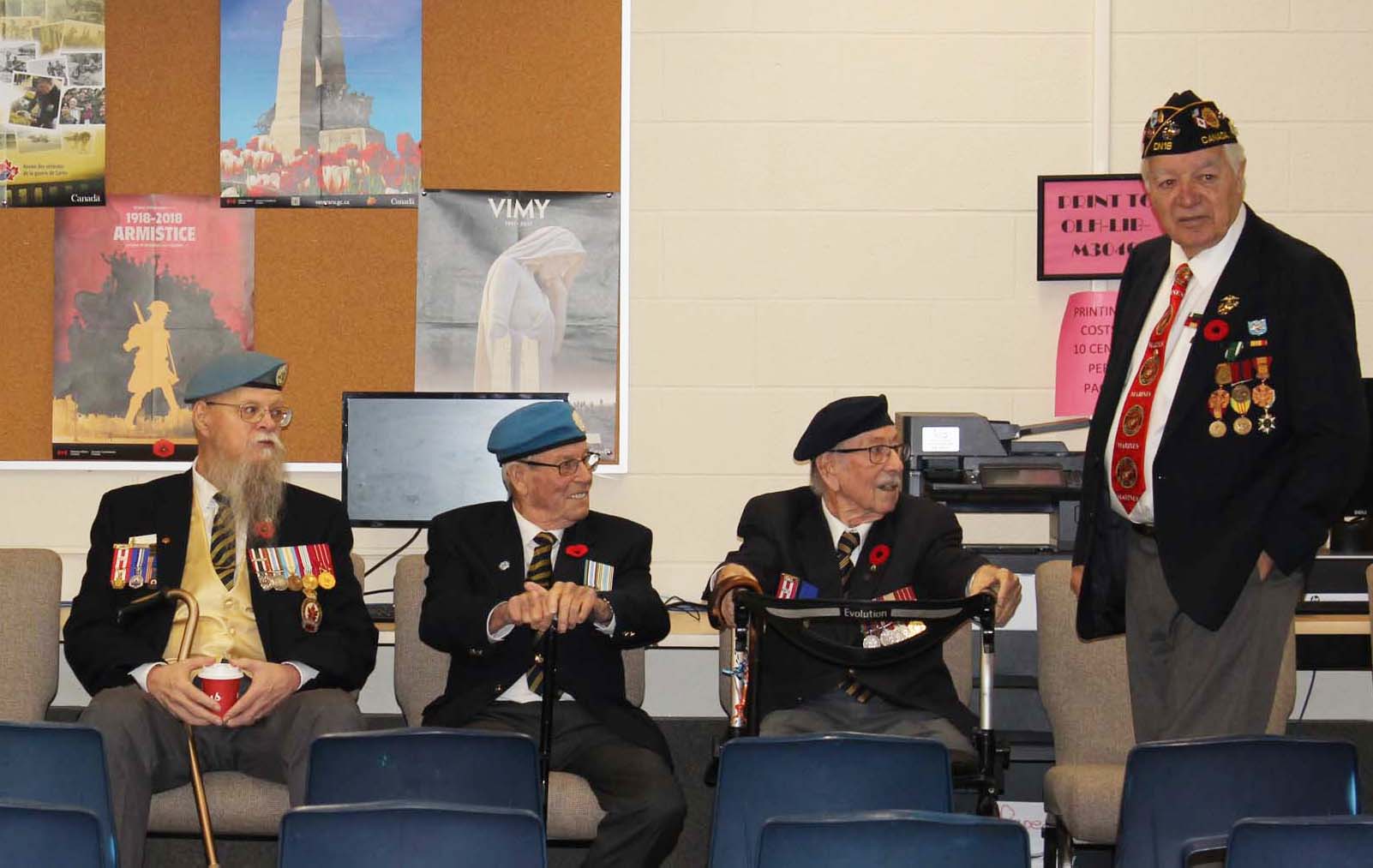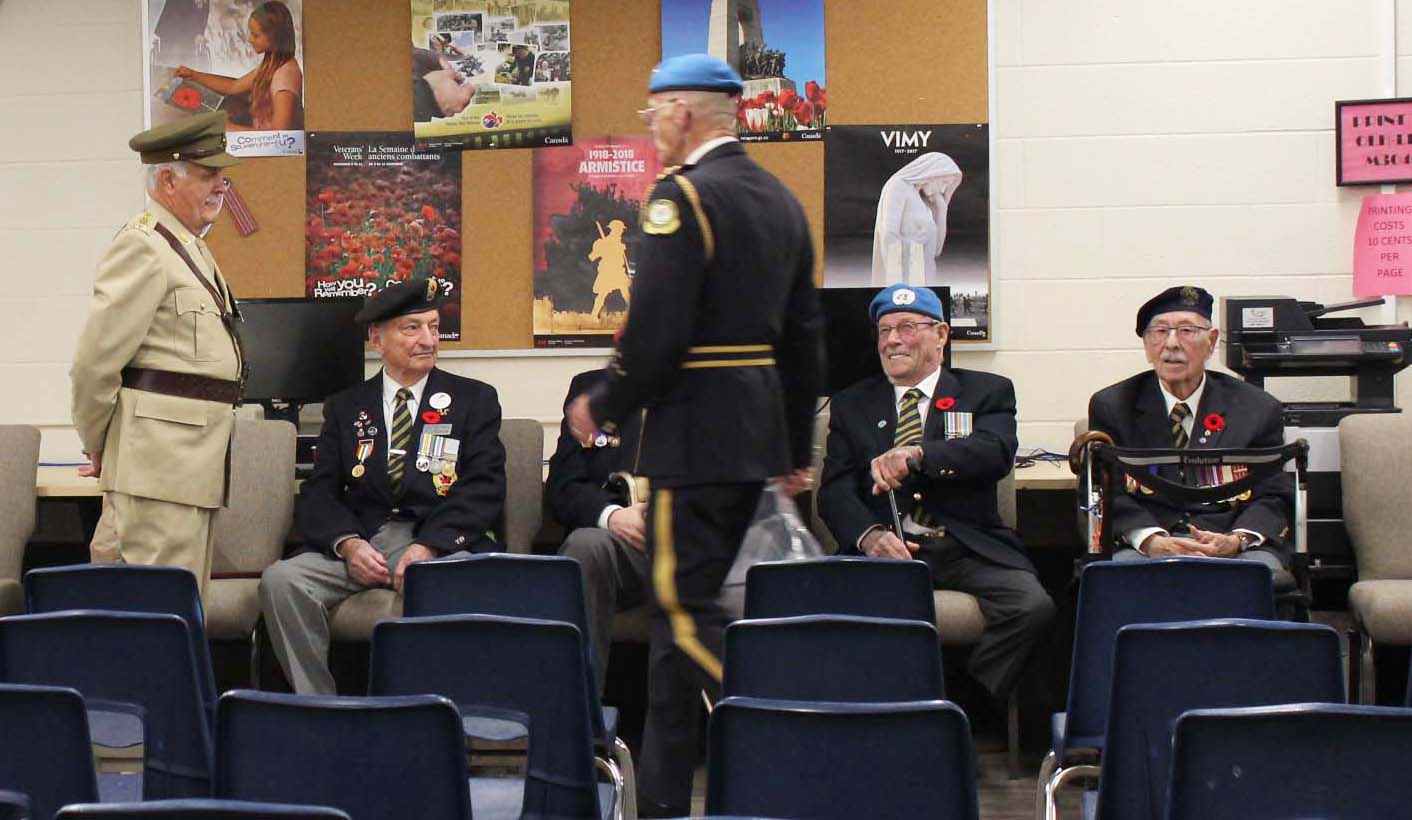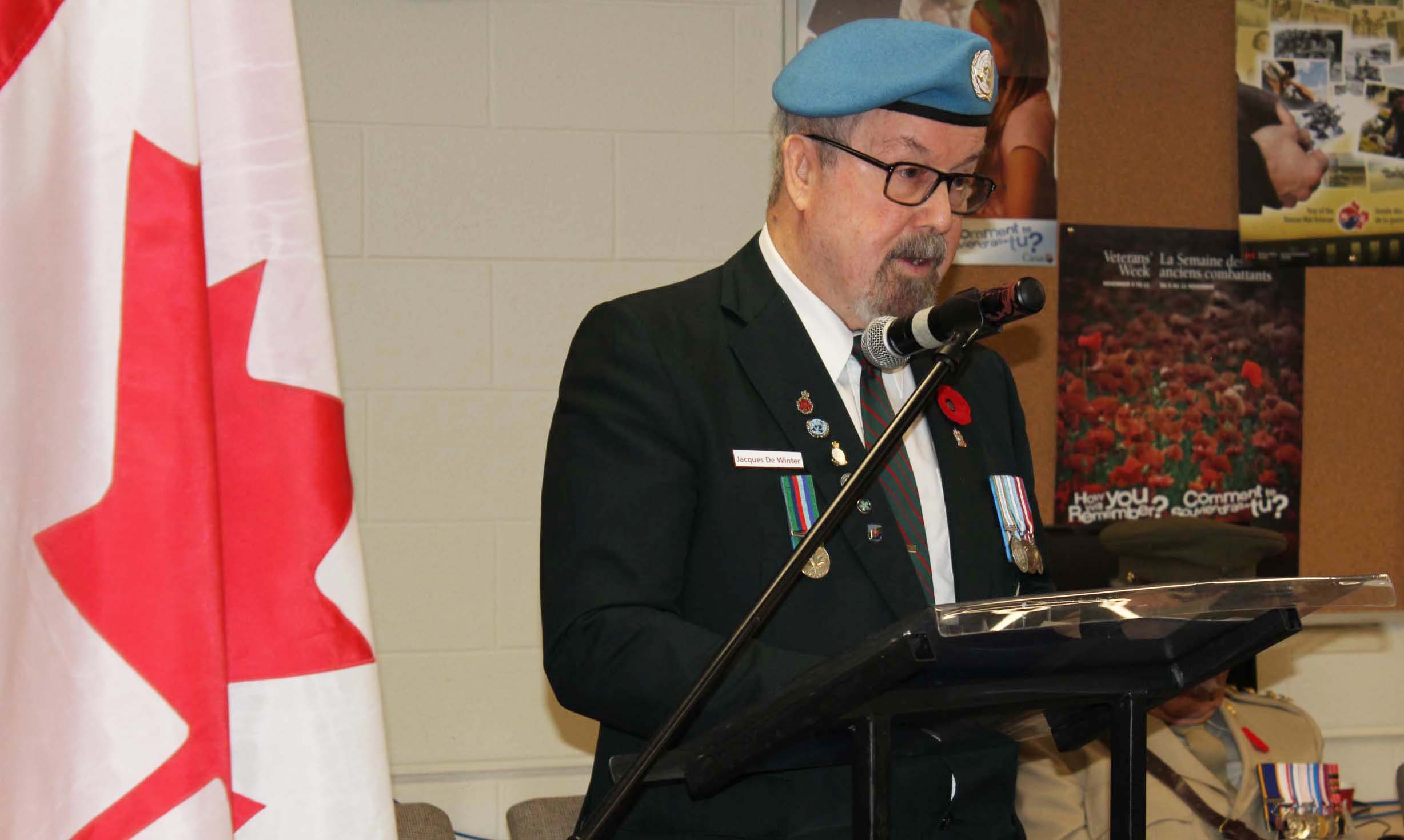GUELPH – Veterans shared stories, wisdom and laughter in the library at Our Lady of Lourdes Catholic High School on Wednesday.
The audience was around four dozen grade 10 civics students, who listened attentively to the veterans.
Throughout the intimate event on Nov. 9, the nine vets chuckled lightly at some memories and spoke solemnly of heavy lessons.
The school organizes the annual veterans panel to teach values that “lead to a peaceful world,” said principal Betty Farrell, who added she feels blessed the tradition can continue this year.
Each veteran was introduced by Joe Tersigni, a school board trustee who taught at Lourdes for 24 years.
Veterans have sacrificed so much “for you to be sitting here today in peace and security,” he said.
The visiting veterans were all between 15 and 19 years old when they enlisted, close in age to many students in the room.
Tersigini suggested students imagine being “called to service at that age.”
He also read the names of those who participated in the school’s first veterans panel over 20 years ago.
“Every year we lose more and more veterans and that’s why it’s so special to have these folks here today,” said Tersigni.
Meet the vets
Sgt. Major James Stoneburgh entered service at 15, and for the next 15 years “traveled all over Europe and the Middle East.”
There is an airport in Damascus, Syria that Stoneburgh said is similar to Pearson International in Toronto, surrounded by weaving roads with lots of cars.
He said one day they were driving on the highway when suddenly there was “a huge explosion” and a fireball threw their white United Nations truck off the road.
Stoneburgh said “life is as exciting as you make it, and the Canadian Armed Forces are one way to get that excitement in your life.”
He reminded students they are the next generation, noting, “You are the people that are going to make a difference.”
Craftsman Ted Ford entered service at 17 with the Royal Canadian Engineers in the late 1950s.
Ford went to John F. Ross High School in Guelph for two years, and said dropping out to join the army was “the best thing I ever did.
Ford spoke of the horrors he witnessed, like finding human remains partially hidden under sand, “from when the Isrealis came through Egypt and just massacred them.”
When he returned home, Ford was “so glad to be back on Canadian soil that it wasn’t funny.
“But my time in the army was well worth every minute of it,” he concluded.

The panel took place in the school’s library, with Remembrance Day posters pinned on the corkboard at the front of the room and chairs lined up ready for the grade 10 students to attend. Photo by Robin George
Cpl. Moe Ferris began service at 17 and was a peacekeeper in the United Nations Navy in Egypt.
“Most of us have seen things you never want to see in your lives,” Ferris said.
He described being with peers, including women, and then “in the blink of an eye you turn around to talk to them and they are no longer there, standing alongside you.
“They are down on the ground, with a bullet in them.”
Ferris painted a picture of the impacts of post-traumatic stress disorder.
He remembered being triggered by fireworks and his wife initially laughing at his reaction.
“That is not comical to me,” Ferris said.
He described having to tell kids to “stay away from Daddy for a while,” because sometimes people suffering from trauma will unintentionally swing out and could hurt someone.
“You didn’t mean it, but it happens.”
Ferris described how at times a group of 16 would leave but only four would return.
When soldiers put their lives on the line, Ferris said, they “are trying to stop the bloodshed and massacres.”
It’s valuable for veterans to discuss memories of war, Ferris said, though many “don’t want to talk about what they’ve gone through. It’s scary enough that we hold it inside.”
If these memories are not shared “we are doomed to repeat,” Ferris said.
The smartest thing Ferris has ever heard, he said, was a lesson from a child.
“She said to me, ‘Sir, I know how to stop all the wars.’”
The grade three student at McCrae Public School in Guelph advised putting all of the world’s leaders in prison “until they hug and kiss each other and mean it,” Ferris recalled fondly.
Ferris asked students to listen carefully and carry the lessons learned in their hearts.
“There is no need for bloodshed in this world,” he said.
Bandsman Chuck Merry, who served with the 11th Field Artillery Regiment during the Second World War, entered service at 17.
“I was a military bandsman, and I enjoyed my time doing it,” he said merrily, because he was “doing something for the rest of the guys, and I think most of them appreciated it.”
The war ended just before Merry was of age to join the combat unit.
Merry and the 23 other band members were all non-combatants.
He described how they would parade the soldiers to the highway in the morning and “when they came up the field at night for supper, and we would play for them while they were eating.”
There were no CDs, DVDs, or earbuds to listen to music then, said Merry, “there just wasn’t anything like that at all. Very few even had a radio.”
The band played music for sing-alongs, traveling shows, concerts, and Friday night dances with buses of “dance hostesses” arriving from Kingston.
“We danced until quarter to 10, because our ‘lights-out’ was 10.”

Veterans mingled at Lady of Lourdes Catholic High School in Guelph before the annual panel began on Wednesday Nov. 9. Photo by Robin George
Rifleman Jacques De Winter entered service at 19 as a United Nations Navy peacekeeper.
“The reason we live in a free and democratic peaceful country today is because of the courage and sacrifices of all those who have served in our armed forces,” said De Winter.
“In the Afghanistan war, we lost 159 people,” De Winter noted, but what is not talked about enough is that 159 families lost and grieved a family member.
Dewinter served in Cyprus after the country “asked the UN to establish a peacekeeping force in 1964.”
People across the world dream for a country like Canada, De Winter said, but for many the dream will never come true.
He said Canadians have the right to be proud of an international reputation as “a force for peace.”
Sgt. David Noonan served with the U.S. Marine Corps during the Vietnam War, entering service at 18.
“Freedom isn’t free. Someone paid a pretty big price for it,” said Noonan, who told a story of a Vietnamese-American kid who fought alongside him and was injured more severely than others.
Noonan said this shows “God’s not fair sometimes when it comes to this stuff, at least in my opinion.”
Master Warrant Officer Edwin Haugen, a Deputy Sergeant Major with the 11th Field Artillery Regiment, entered service at 17.
Haugen is a graduate of the Wellington Catholic District School Board.
He said Canadian military responsibilities include providing support with COVID-19 outbreaks in long-term care homes.
His duties involved “taking care of these people, washing them,” doing laundry, and even zipping the bodies of elders who died of COVID-19 into body bags.
“We do more than just artillery things,” Haugen said.
“We do other things helping in our communities as we are called upon.”
Able Seaman Michael Bladon joined the Navy at 17.
Most of his work was humanitarian, Bladon said, like “taking in food and clothing” to Korean people, who were isolated and lacking resources during the Korean War from 1950 to 1953.
As peacekeepers Bladon said they patrolled constantly.
“We would darken the ship each night and patrol up and down the coast, challenging any intruders,” he said.
In 2012, July 27 became Korean War Veterans Day in an effort to ensure the Korean War is no longer considered the forgotten war, Bladon said.
Capt. Rod Pettigrew served with the 11th Field Artillery Regiment, entering service at 16.
He was in the military for 42 years. Pettigrew wanted to go to Vietnam but was not able to because his mother would not sign permission.
Pettigrew was eventually appointed top Sergeant Major for all units in Ontario, “and I was training all these fellas.”
His trainees include panel members Stoneburgh and Haugen.
Pettigrew brought meal packs of ready-to-eat dehydrated food for the students to check out, and explained that in the mid 1960s they were eating packs produced in the early 1950s.
The one passed around during the assembly was made in 2010, and Pettigrew laughs how he would still eat it but his wife, who adheres more closely to expiry dates, would not.
At the end of the panel the students asked questions and could shake hands with each of the vets, who then stayed for a lunch served by the school’s food and nutrition class.
Our Lady of Lourdes plans for the entire student body to attend Remembrance Day events in downtown Guelph on Nov. 11.




